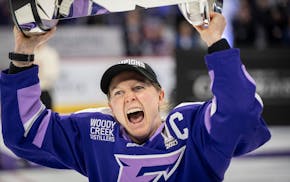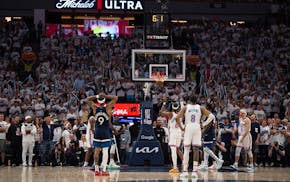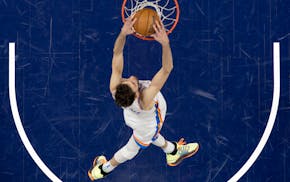In each of their preliminary swims at the Paris Olympics, Regan Smith and Kaylee McKeown were separated by mere hundredths of a second in the 100-meter backstroke.
Smith had the faster times in the initial heats, swimming 58.45 seconds to McKeown's 58.48. They had the two best times in the semifinals, with Smith's 57.97 edging McKeown's 57.99.
This was to be expected. Entering these Olympics, Lakeville's Smith and McKeown of Australia owned the 15 fastest times in history in the event. They had each held the world record over the past five years. Smith, 22, snatched it back at the U.S. Olympic trials last month with a 57.13, two-tenths of a second lower than McKeown's 57.33 set in 2023.
But when their highly anticipated Olympic showdown arrived Tuesday, McKeown pulled away, winning the gold medal in an Olympic record time of 57.33, .33 of a second ahead of Smith. Katharine Berkoff of the U.S. was third in 57.98.
"I knew it was going to be such a fight. Kaylee is an exceptional competitor, and Katharine broke 58 this year, so this is the fastest 100 backstroke final ever," Smith told reporters in Nanterre, France. "The key was to stay in my own lane, in my own race. I wanted to leave it all in the pool for this amazing crowd, and that's what I did. It's really special."
McKeown, 23, was the defending champion in the event and earned her fourth career Olympic gold medal. Smith won the bronze medal in the 100 backstroke at the Tokyo Games three years ago and now has four Olympic medals, including silver in the 200 fly and the 400 medley relay.
Smith led at the turn Tuesday, but McKeown surged to the front about halfway through the return lap.
"I knew it was going to come down to the last 5 meters," McKeown said. "We're both extremely good athletes, and both extremely good trainers, so it's just who feels better on the day, and she pushed me the whole way through."
Smith's return to the Olympics caps a tumultuous time for the Minnesotan. Even before the Tokyo Olympics, she was struggling with her confidence in another of her signature events, the 200 backstroke. After Tokyo, she went to Stanford, but the team's training regimen turned out to be a poor fit. She left Stanford and moved to Arizona to train with Bob Bowman, the former coach of Michael Phelps, the most decorated Olympian of all time with 28 medals. Smith has since followed Bowman to Austin, Texas, where he is the director of swimming at the University of Texas.
The grinding physical workouts with Bowman and a lot of mental work over the past 18 months had Smith at the top of her game heading into the Paris Olympics.
She is still looking for her first Olympic gold medal, and has two more chances in the 200 butterfly on Thursday and the 200 backstroke on Friday.
The problem is that in the 200 butterfly 17-year-old Canadian phenom Summer McIntosh, already a two-time medalist in Paris, awaits. And in the 200 backstroke Smith likely will have to again face McKeown, the reigning world and Olympic champion and the world record holder.
"The thing that is most important is that we are pushing the sport in the right direction," Smith said Tuesday of the U.S. rivalry with Australia. "Our rivalry is great for attention in the sport. We have so much respect for each other."
Her father, Paul Smith, said before the Olympics that his daughter had a "legitimate shot at three individual gold medals, and she has a legitimate shot at zero."
Whatever disappointment Smith might have felt Tuesday was mitigated by the presence of her parents at the pool. No fans or family were allowed at the Tokyo Olympics, and Smith said, "I got pretty lonely."
On Tuesday, for this latest Olympic achievement in her career, she said, "I got to share this with my family."
The Star Tribune did not send the writer of this article to the event. This was written using a broadcast, interviews and other material.
Rochelle Olson, Rachel Blount and the Associated Press contributed reporting.

PWHL expansion to Seattle and Vancouver could shake up Frost's championship team

RandBall: 10 things to know about Minnesota sports today

Meet the best high school freshman athletes in Minnesota
![Anthony Edwards, Julius Randle and the Wolves were always a step behind the Thunder on Monday.
] CARLOS GONZALEZ • carlos.gonzalez@startribun](https://arc.stimg.co/startribunemedia/CJVGEXG7INGRNHAEH5TAVZQ24U.jpg?h=91&w=145&fit=crop&bg=999&crop=faces)
Podcast: Patrick Reusse on why he never thought the Wolves would win Game 4
